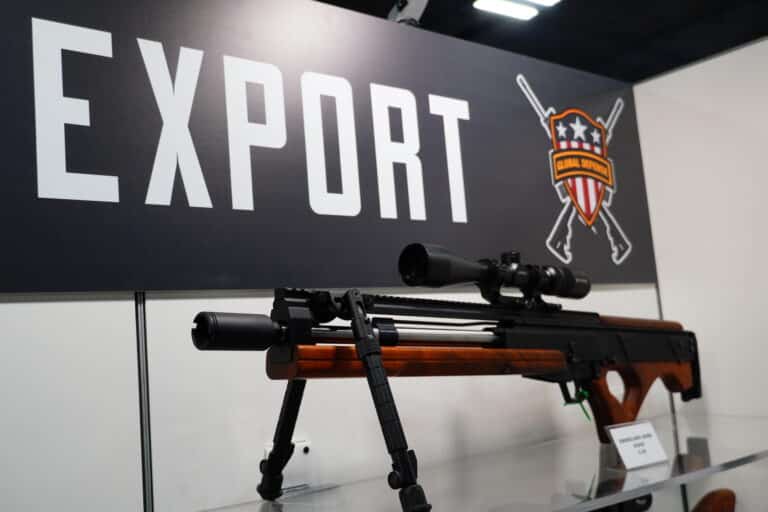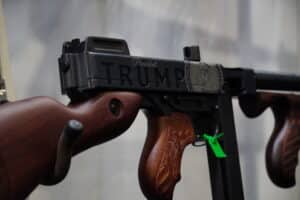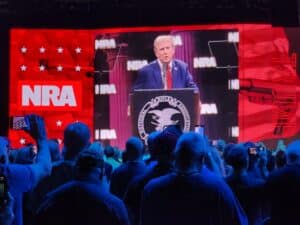Las Vegas, Nevada — Jordan Young sits in a small booth at SHOT Show 2024 among hundreds of other booths in the Venetian Expo Center on the Vegas Strip. He’s working to recruit new customers for his firearms export business, Global Defense. But he worries the Biden Administration’s plan to restrict those exports will make the effort pointless.
“I would be done,” Young told The Reload. “Out of business.”
Over the past 90 days, the Commerce Department has “paused” issuing new gun export licenses while it reviews its regulations in an effort it has said is designed to prevent American-made guns from falling into the wrong hands. Exporters like Young can still operate under their previously granted licenses, but the licenses come with restrictions on quantity. Plus, Young said Commerce was slowing down licensing even before the pause.
“I started seeing a backup in July in the summer,” he said. “I’ve gotten four licenses since last July.”
He used to get about five per month.
“You don’t have a sale without a license,” Young said. “You can have the money, you can have the guns, you can have everything in place. But, if you don’t have a license, you don’t have a sale.”
Late last month, The Reload published a leaked draft of the proposal Commerce plans to reveal after the pause ends. The plan would impose a slew of new conditions for obtaining an export license for civilian sales of certain firearms, including popular semi-automatic rifles and shotguns. Among the most stringent is a requirement that exporters identify civilian end buyers obtaining passports or other official government IDs.
Senators Dick Durbin (D., Ill.) and Elizabeth Warren (D., Mass.) joined with Representatives Joaquin Castro (D., Texas 20) and Norma Torres (D., Calif. 35) to praise the pause and advocate for an extension. In a letter to the department this week, they called on Commerce to adopt the passport rule and numerous other restrictions.
“As more and more firearms have left American shores, their impact in other countries has worsened,” they wrote. “Reports abound of U.S.-manufactured weapons being used in horrific killings across the globe.”
Young rejected the assertion that he’s responsible for violence in the nations he exports guns to.
“Violence will happen, no matter where you are, no matter what you’ve got. They’ll use a rock, they’ll use a knife, they’ll use a car,” he said. “I mean, they’ll use anything. The bad people are still bad people.”
He also stressed that he only deals with properly licensed importers who follow the laws of the nations they operate in.
“We vet everyone before we even take a license to the Commerce Department. It’s not like I deal with everyone off the street,” Young said. “Our guns are going to licensed importers and distributors in those countries. They have to have licensing, and they have to follow the rules of their country.”
Young said he got into the gun industry because he believes firearms are an “equalizer” for people looking to defend themselves.
“I believe that every person, regardless of where they are geography, has the right to defend themselves,” Young said.
He called the Biden Administration’s proposed export plan “impractical and impossible” and argued that Americans would be justifiably upset if other countries tried to impose similar import restrictions.
“I think it’s going to be setting us up for failure if we can’t rely on our partners and allies around the world to do their job,” he said. “I got to do my job; you’ve got to do your job. Everybody’s got to be responsible for themselves. They work in their own countries; they follow their laws, and they need to be responsible for that. It’d be like if foreign governments told their gun companies to ask American dealers, ‘Who’s buying every gun?’ Then say, ‘Give me a copy of the FBI background check.'”
The draft rule tightens restrictions on licenses for exports to any country that isn’t in the Wassenaar Arrangement, like Israel. But the new restrictions would also be placed on some countries in the agreement, such as Ukraine. In effect, any country that isn’t considered “Group A:1” under Bureau of Industry and Security classifications would fall under the new export requirements.
During the pause on civilian exports, Israel and Ukraine were explicitly exempted, but they would be subject to the rules in the draft proposal. Commerce emphasized that the draft only represents a work in progress and “no decisions on potential policy changes” have been made, especially on how Israel and Ukraine will be treated after the pause.
Young said he has been granted an export license to Ukraine during the pause. But the process took three times as long as usual, and Commerce has been slow to grant licenses to other countries that aren’t supposed to be affected by the pause.
“They haven’t said much. I’ve noticed that they’re asking for a lot more documents than they have in the past. They’re not issuing the license, though,” he said. “They’re supposed to be, as I understood it, continuing to process and issue the licenses for the A1 countries. But I even had to beg them for Switzerland. Beg them. That was one in July that I submitted before the pause.”
Young said he isn’t opposed to following American export policy. However, he questions the logic behind the proposed rules.
“I understand US foreign policy, and I abide by US foreign policy. If they don’t want me to export to a certain country, all they have to do is say ‘No,’ and I don’t export to it. I’m a lawful citizen. I’m an honest guy. I follow our foreign policy. But if our foreign policy is to shut off exports of all of our stuff that the whole world, that doesn’t make a lot of sense.”
He argued the changes aren’t coming from Commerce and the agency is “getting thrown under the bus.”
“I still have a good working relationship with Commerce. It’s not the guys. They’re good, hard-working people,” he said. “I know most of the chiefs, I know most of the licensing officers, the mid-level managers at all these different agencies. I’ve been working with them for years and years and years. It’s not them. They’re doing their job.”
Instead, he views the changes as politically-motivated. Part of what he described as “a concerted effort” by the Biden Administration to diminish the firearms industry.
“Whatever his logical rationale is, he don’t like it,” Young said.
But he said the export pause and proposed new restrictions wouldn’t hit everyone in the industry equally. Large or multi-national gun makers might not see a significant hit or could be able to mitigate any effects by moving international export manufacturing to other countries. Young said midsized companies could see 20 to 30 percent of their business affected.
But exports are a huge part of Young’s business, and he’s worried the Biden Administration will repeat the same maneuver to wipe out the other side of his business.
“Exporting is about half of my business. We also import,” he said. “But I expect that will be next; the import will be next.”
He said smaller companies like his and some of the manufacturers he works with could have trouble surviving under the proposed rules.
“We do a few million dollars a year. It’s not a huge amount,” he said. “We’re a younger company. I’m trying to grow.”
Visibly upset, Young turned to thinking about his future.
“I’m doing what I love. I finally became my own boss, an entrepreneur, doing everything that I wanted to do, and it could all be done tomorrow,” he said before excusing himself to take a meeting with a prospective client he hopes won’t be his last.






